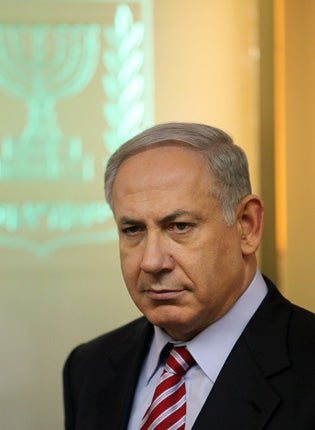Netanyahu meets Obama for crisis talks to defuse tensions
Israeli PM is reminded of duty to 'tell the truth' as he flies into Washington

Israel's Prime Minister Benjamin Netanyahu arrived in Washington yesterday for talks with President Obama and members of his administration aimed at defusing tensions between the two countries.
But they seemed no nearer a resolution to the row over new Israeli settlements, especially in disputed East Jerusalem. The hastily-arranged White House meeting, due today, would not have taken place at all but for Sunday's crucial healthcare vote in Congress, which led Barack Obama abruptly to cancel a foreign trip that would have seen him in Indonesia and Australia at the very moment Mr Netanyahu was in the US, to address the annual conference of AIPAC, the main pro-Israeli lobby group here.
That it has been scheduled is a sign of both sides' desire to end what has been described as the worst crisis in decades in Israel's relations with its most important ally. But the US is still smarting from Israel's announcement, during a visit by Vice-President Joe Biden earlier this month, that it would build 1,600 housing units in East Jerusalem.
In a speech to AIPAC yesterday, Hillary Clinton, the Secretary of State, warned that new settlements on land claimed by the Palestinians threatened peace prospects and undercut Washington's ability to broker an end to the conflict. The East Jerusalem plan in particular exposed differences that "others" could exploit, she noted, in a thinly veiled reference to Iran.
"We objected to this announcement because we are committed to Israel and its security, which we believe depends on a comprehensive peace," Mrs Clinton said – adding it was an ally's duty to "tell the truth when needed".
Her remarks were greeted coolly, in marked contrast to the loud applause when she talked tough against the regime in Tehran. A nuclear-armed Iran, she said, was unacceptable. "It is unacceptable to the United States. It is unacceptable to Israel. It is unacceptable to the region and the international community." She pledged that the US would seek "sanctions that will bite".
A day before Mrs Clinton spoke, Iran's supreme leader Ayatollah Ali Khamenei brushed off Mr Obama's latest message that Washington's offer of better relations was still on the table. Instead, the Ayatollah accused the US of plotting to overthrow the clerical regime.
During his stay the Israeli premier will meet Mrs Clinton, and have dinner with Mr Biden, whose unhappy visit to Israel had been intended to cap agreement between Israel and Palestine to restart indirect "proximity" talks, indirect contacts channelled through the US Middle East envoy, the former senator George Mitchell.
Mr Netanyahu has made some concessionary gestures, including a profession of willingness to include preliminary discussion of key points of contention, such as the status of Jerusalem and the right to return of Palestinian refugees, in the proximity talks. But in remarks at a cabinet meeting before his departure for the US, the Prime Minister did not give an inch on the issue of East Jerusalem. His policy was that of every Israeli premier since 1967: "from our point of view, construction in East Jerusalem is like construction in Tel Aviv".
The friction between the two countries has caused increasing concern both in Israel and in the Jewish community here – on its liberal and conservative wings.
"Our commitment to Israel and its security now and in the future, is rock-solid, enduring and for ever," Mrs Clinton told AIPAC. But doubts are starting to gnaw, especially in Israel, a country Mr Obama has yet to visit as President, and which suspects that he is less instinctively supportive of the Jewish state than any of his predecessors.
*Israeli forces opened fire on each other along the Gaza border yesterday, killing one of their own soldiers in an incident in which three Palestinian infiltrators were captured, a military spokesman said. Two separate forces had been alerted to a suspected infiltration from Hamas-ruled Gaza, but neither knew the other was in the area, the spokesman said. One of the forces "mistakenly identified the tank team (at the site) as suspects and began opening fire."
Subscribe to Independent Premium to bookmark this article
Want to bookmark your favourite articles and stories to read or reference later? Start your Independent Premium subscription today.

Join our commenting forum
Join thought-provoking conversations, follow other Independent readers and see their replies